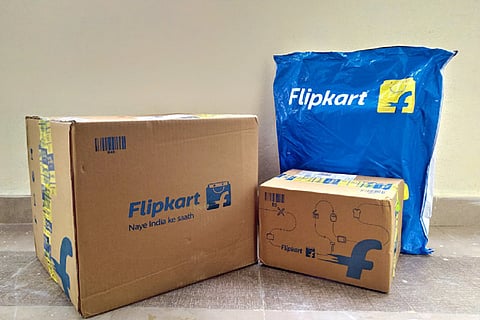

The Central Pollution Control Board (CPCB) has issued a show cause notice to Flipkart and Patanjali Peya for closure for violating the Plastic Waste Management Rules, 2018. This was revealed through a submission CPCB made to the National Green Tribunal (NGT).
This action was taken in response to a petition filed by 16-year-old Aditya Dubey against Amazon and Flipkart for using excessive plastic packaging material without meeting statutory liability. In October 2019, Aditya pleaded the NGT, through his legal guardian, to direct Amazon and Flipkart to stop their excessive use of plastics in the packaging of goods delivered by them.
The NGT had observed that the statutory regulators (PCBs) were not taking coercive measures to enforce the plastic waste management rules. It directed the CPCB to look into the matter, assess and recover compensation for violation of environmental norms.
In its response, the CPCB said that it issued show cause notices for closure and for levying environmental compensation to Flipkart and Patanjali Peya on October 8 for not complying with PWM Rules.
In the case of Flipkart, the CPCB said that it had issued notices to Flipkart to Flipkart to submit an application to register under the PWM Rules, 2018. It also said that it issued notices seeking to know Flipkart’s connection with Instakart Services. Instakart is the logistics arm of Flipkart and Myntra.
However, no communication has been received from Flipkart till date on the matter, following which CPCB issued a show cause notice for closure.
This show cause notice also comes ahead of Flipkart's flagship festive sale that is set to begin on October 16, which would see an increase in packages being delivered.
For Patanjali, the CPCB issued notices to Patanjali Peya over violation of Rule 9 of the PWM Rules on August 19, seeking a response within seven days. However, no reply was received, it said.
The Rule 9 states that companies and brand owners need to establish a system to collect back the plastic waste generated due to their products and that a plan of collection should be submitted to the State Pollution Control Boards.
Both companies have been given 7 days to reply from the date of the notice, failing which appropriate action will be taken against them under the provision of Environmental (Protection) Act, 1986.
The CPCB told NGT that it has also issued a show cause notice for levying of Environment Compensation to Hindustan Coca-cola Beverages, Pepsico India Holding, Bisleri International and NourishCo Beverages Ltd for non-compliance of provisions of PWM Rules, 2018.
“They have not provided information for evidence-based assessment of implementation of Action Plan for fulfilment of Extended Producer Responsibility (EPR) liability. Further, the documents submitted by them have not been endorsed by SPCB/Pollution Control Committee/Urban Local Bodies.”
The CPCB also said that Amazon Seller Service, Coca-cola India, Parle Agro and IRCTC have been recently granted registration as a brand owner/producer under Plastic Waste Management (PWM) Rules, 2018.
“They are required to submit quarterly progress reports and comply with conditions stipulated in the Registration certificate issued to them.”
According to the Plastic Waste Management Rules, the primary responsibility for collection of used multi-layered plastic sachets or packaging lies with producers, importers and brand owners who introduce the products in the market.
The Rule 9 (1) of the PWM rules, 2016 stated that these producers need to work out modalities for a waste collection system involving State Urban Development Departments, either individually or collectively, through their own distribution channel or through the local body concerned
Further no person shall manufacture carry bags or recycled plastic bags or multi-layered packaging unless the person has obtained a registration from the State Pollution Control Board even before they begin production.
In directions issued to SPCBs on October 6, the CPCB had identified 78 companies that were operating without registration from concerned authorities. CPCB had also observed that most of these brand owners and companies who have applied for registration do not respond to queries raised by CPCB for considerably long duration and are non-compliant as per provisions of PWM Rules during this period.
In the order dated October 6, the CPCB directed SPCBs to identify brand owners and companies operating without registration and take action against defaulting units as per provisions of Plastic Waste Management Rules, 2018 which shall include closure of their operations, and levying Environmental Compensation.
This list of 78 companies included several large brands such as Microsoft Corporation India, Godrej Tyson Foods, Colgate Palmolive, Philips India, Panasonic India, Future Consumer, Coromandel International, Indo Nissin Foods, Skoda Auto Volkswagen India, Haldiram, Toyota, Wrigley, RayBan, GlaxosmithKline, Cloudtail India, Kellog India, among others.